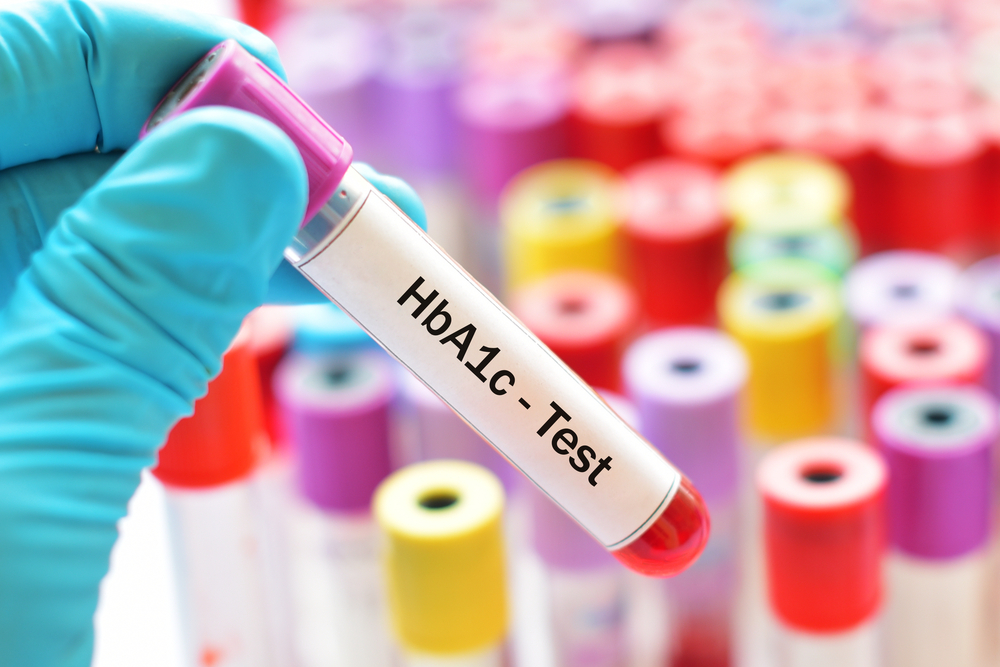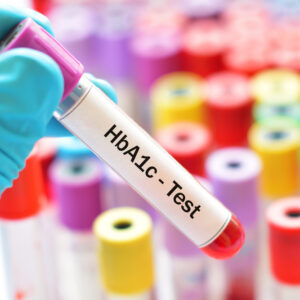What is fasting blood glucose?
“Fasting blood glucose” refers to the baseline insulin secretion blood glucose index after fasting for at least 8 hours. It is also one of the indicators for diagnosing diabetes.
After a few hours of fasting, the pancreas produces a hormone called glucagon, which causes the liver to release glucose (blood sugar) into the bloodstream. At this point, insulin regulates the blood glucose levels in the body to prevent harm.
Therefore, if the individual being tested does not have diabetes, the body produces insulin to maintain fasting blood glucose levels within the ideal range. However, if the individual has diabetes, the body cannot produce sufficient insulin or respond appropriately to insulin, leading to fasting blood glucose levels exceeding the normal range.
| Fasting Blood Glucose Index | Diagnosis Results |
| Below 5.5 mmol/L (100 mg/dl) | Normal |
| 5.5 – 6.9 mmol/L (100 mg/dl – 125 mg/dl) | Impaired fasting glucose |
| 7 mmol/L or above (126 mg/dl or above) | Diabetes |
Why is the fasting blood sugar level high?
Stress can lead to an increase in cortisol (a hormone involved in stress response, also known as “the stress hormone”), which, along with other pro-inflammatory cells, promotes glycogen breakdown (conversion of stored glucose into sugar released into the bloodstream) and gluconeogenesis (production of more glucose from non-carbohydrate sources within the body). Therefore, when the body produces excessive cortisol, fasting blood sugar levels can become excessively high.
Inadequate sleep or poor sleep quality can lead to impaired cellular response to insulin, resulting in an increase in fasting blood sugar.
Women with type 1 diabetes experience greater fluctuations in blood sugar levels during menstruation, which can affect fasting blood sugar levels. Additionally, during pregnancy, hormones secreted by the placenta can also cause an increase in fasting blood sugar levels in pregnant women.
Certain medications such as corticosteroids and mood stabilizers can potentially raise blood sugar levels. Additionally, some statins used for heart health and diuretics have the potential to affect the pancreas and glucose regulation within the body or interfere with insulin secretion, leading to elevated blood sugar levels.
What Factors Affect Fasting Blood Sugar Levels?
To understand why fasting blood sugar levels can be affected in the morning, it is important to be aware of the “Somogyi Effect” and the “Dawn Phenomenon.”
The Somogyi Effect, also known as rebound hypoglycemia, is commonly observed in individuals with type 1 diabetes. It occurs when low blood sugar levels are experienced during the night, triggering a reverse hormonal response that stimulates gluconeogenesis and glycogen breakdown to raise blood sugar levels. Individuals with type 1 diabetes, who lack endogenous insulin, are more sensitive to hormonal changes. Even a slight decrease in blood sugar levels during the night can lead to a rapid increase in fasting blood sugar levels the following morning.
The Somogyi Effect typically occurs due to excessive insulin injection in individuals with type 1 diabetes or inadequate nutrient intake during dinner.
To improve this situation, it is important to increase the dose of short-acting oral hypoglycemic medications before dinner under the guidance of a doctor, while reducing the dose of intermediate-acting medications. Additionally, a small dose of intermediate-acting insulin can be administered before bedtime.
The Dawn Phenomenon is a natural physiological phenomenon. During normal physiological mechanisms, growth hormone, cortisol, catecholamines, and other hormones increase secretion during the late night to early morning period. Under the influence of these hormones, stored glycogen in the liver is converted into glucose, leading to an increase in blood sugar levels.
In addition, due to the inability of pancreatic cells in diabetic patients to secrete sufficient insulin to balance blood sugar fluctuations, hormonal imbalance occurs, leading to a significant increase in fasting blood sugar levels in the morning.
There are 4 main reasons for the occurrence of the Dawn Phenomenon:
- Impaired pancreatic islet cell function: The dysfunction of pancreatic islet cells can result in insufficient insulin secretion, leading to elevated blood sugar levels in the morning.
- Reduction in antidiabetic medication or insulin dose the night before: A decrease in the dosage of antidiabetic medications or insulin injection the previous night can contribute to higher fasting blood sugar levels in the morning.
- Late dinner or excessive food intake the night before: Consuming a late dinner, consuming a large amount of food, or eating snacks before bedtime can lead to elevated blood sugar levels in the morning.
- Hyperactive endocrine function in younger diabetic patients: Younger individuals with diabetes may have more hyperactive endocrine function, leading to increased secretion of hormones such as growth hormone or adrenal and cortical hormones that counteract the effects of insulin.
To improve this situation, it is advisable to adjust the dosage of blood sugar-lowering medications or increase the insulin injection before bedtime under the guidance of a doctor.
What to do if fasting blood sugar is high?
Individuals with high fasting blood sugar should follow the principles of a healthy diet pyramid, aiming for a balanced diet, regular meal times, and controlled calorie intake. It is important to pay attention to the total food volume and the combination of food types in each meal, consume high-fiber foods, and control the intake of fats and sugars. Considering implementing a “low glycemic index (GI) diet” can also be beneficial.
The glycemic index (GI) represents the impact of food on blood sugar levels. Generally, low GI foods have higher fiber content, provide a greater feeling of fullness, and are digested more slowly, resulting in a slower rise in blood sugar after a meal. Therefore, they can help stabilize blood sugar levels and reduce the risk of diabetes.
The low GI diet has the following 3 principles:
| Reduce carbohydrate intake | Instead of focusing on avoiding “sugar,” it is important to control the intake of “carbohydrates.” This means consuming fewer refined starch foods such as toast, noodles, and white rice, and opting for whole grains, oats, sweet potatoes, and other high-quality starches. |
| Moderate protein intake | Protein-rich foods, such as fish, meat, dairy products, eggs, and legumes, can help maintain bodily functions. It is recommended to choose lean meats over fatty meats and white meat over red meat. Cooking methods should be light with minimal oil and smoke. |
| Increase dietary fiber intake | Consuming foods high in dietary fiber not only increases satiety and reduces excessive calorie intake but also stimulates the secretion of specific hormones in the intestines, enhances insulin sensitivity, and helps control blood sugar. |
Regular exercise is crucial for managing diabetes. It is recommended that individuals with diabetes engage in 150 minutes of moderate-intensity or 75 minutes of vigorous-intensity aerobic activities per week, along with muscle-strengthening activities on at least 2 days (non-consecutive) per week.
Due to the potential risks, such as retinopathy or underlying heart disease, associated with diabetes, as well as the possibility of experiencing low blood sugar during exercise due to certain blood sugar-lowering medications, it is important for individuals with diabetes to consult their doctor to make appropriate and targeted adjustments regarding the type, frequency, and duration of exercise.
Self-monitoring is of great help in the treatment of diabetes for individuals with high fasting blood sugar.
- Conducting self-blood glucose monitoring to ensure that fasting and postprandial (2 hours after a meal) blood sugar levels are within the target range.
- Keep a record of self-monitoring blood glucose and discuss the records with healthcare professionals to establish blood sugar control goals.
- Analyze the relationship between changes in diet, exercise, or lifestyle and blood sugar levels based on self-monitoring blood glucose records to make improvements and establish a healthy lifestyle.
- Be aware of blood sugar levels when experiencing symptoms of hypoglycemia to avoid complications or risks associated with low blood sugar.
FAQs about Fasting Blood Sugar
People undergoing fasting blood sugar tests should abstain from eating for 8-10 hours before the test. Therefore, it is best to perform the test in the morning after providing sufficient fasting time for the body.
In addition to fasting blood sugar, postprandial (2 hours after a meal) blood sugar (mmol/L) and glycated hemoglobin (HbA1c) (%) are important diabetes testing indicators. Glycated hemoglobin reflects long-term blood sugar control, while postprandial blood sugar measures the body’s ability to metabolize glucose.
| Blood Sugar Control Indicators | Target Range |
| Fasting Blood Sugar (mmol/L) | 4-6 |
| Postprandial Blood Sugar (mmol/L) | <10 |
| Glycated Hemoglobin (%) | <7 |
- 1The Global Diabetes COMMUNITY
- 2Verywell health
- 3Eating Well
- 4Health Bureau of Government
- 5CHP
- 6Diabetes HK






